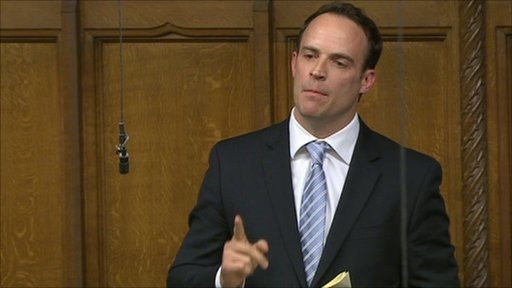 The Commons will debate the
UK’s controversial extradition treaty with the US and the European Arrest Warrant later today. The debate has been brought by Dominic Raab MP. He was on the Today programme this morning,
explaining that he wanted to introduce a ‘forum clause’ to the UK-US treaty. Forum is a principle that
could apply in cross-border cases like Gary McKinnon’s, which Raab has been championing. Raab wants to end the ‘sort of haggling between prosecutors behind closed doors’ that
governs extraditions at present, and reform the process by placing it before open court in Britain. He argues that numerous other countries enjoy such an arrangement with the US, why
shouldn’t its ‘stalwart’ British allies? He also wants new protocols to be introduced to the European Arrest Warrant to ensure that warrants are not issued for minor offences, and
to guarantee that citizens are only extradited for prosecution and not investigation.
The Commons will debate the
UK’s controversial extradition treaty with the US and the European Arrest Warrant later today. The debate has been brought by Dominic Raab MP. He was on the Today programme this morning,
explaining that he wanted to introduce a ‘forum clause’ to the UK-US treaty. Forum is a principle that
could apply in cross-border cases like Gary McKinnon’s, which Raab has been championing. Raab wants to end the ‘sort of haggling between prosecutors behind closed doors’ that
governs extraditions at present, and reform the process by placing it before open court in Britain. He argues that numerous other countries enjoy such an arrangement with the US, why
shouldn’t its ‘stalwart’ British allies? He also wants new protocols to be introduced to the European Arrest Warrant to ensure that warrants are not issued for minor offences, and
to guarantee that citizens are only extradited for prosecution and not investigation.
The US government is apparently none too pleased about this and has urged its British counterpart to quash the debate. But Whitehall has not acquiesced, fearful of the current mood on the backbenches and the depth of public feeling over McKinnon. The episode highlights the fact that backbenchers can still assert significant and independent influence in parliament, despite the overbearing executive, the power of the whips and worries about career advancement.
It’s little surprise that Raab is the MP forcing this issue. The karate-loving MP recently won the Spectator’s ‘Newcomer of the Year’ at our Parliamentarian of the Year Awards in recognition of the numerous campaigns he has launched over the last 18 months. Here are some notable examples:
1) Human rights and the law. Tonight’s debate is, in many ways, an extension of his campaign against the government opting into the European Investigation Order, which Raab believes has weakened the government’s ability to protect its own citizens under the rule of law. A trained lawyer, he is also a strident critic of the Human Rights Act. He has been a frequent advocate of a British bill of rights; and he closed the prisoners’ rights debate with an impassioned defence of the view that parliamentary sovereignty is superior to judge-made law.
2) The meritocracy must flourish. Raab is also keenly meritocratic. His first parliamentary campaign, in July 2010, was to secure a review against ‘positive discrimination’ on two Foreign Office work experience schemes that denied access to white males other than those from underprivileged backgrounds. He still champions the meritocratic cause, telling an audience at a recent Cambridge Union debate:
‘My father came to Britain as a refugee, a Czech Jew. He married my mother, an English Protestant. I married a Brazilian Catholic. When we have children, I’ve got no idea which box they should tick on the diversity questionnaires. I hope they’ve been scrapped by then. Because I want my children to grow up in a meritocratic society, where they are judged as individuals – blind to race, religion, gender and sexuality. And if we prize equality as a value, not a political bandwagon, we must apply it consistently. There’s not two types of discrimination: good and bad, negative and positive. They’re both wrong, on principle — and counter-productive in practice.’
3) Against undue influence. Throughout the spring and early summer of 2011, Raab launched several motions against trade union ‘Pilgrims’ working in government departments and agencies, arguing that union activity should not be subsidised by the taxpayer. Eventually, the government came to adopt his position in October.
4) He has also campaigned against union strike ballots, insisting that militant union leaders should not be able to hold the country to ransom without receiving the votes of more than 50 per cent of union members.
Like Labour MP Stella Creasy, who won our ‘Campaigner of the Year Award’ for her work on the punitive interest rates attached to payday loans, Raab proves that new backbenchers need not just be silent ‘yes men’ waiting for promotion.






Comments